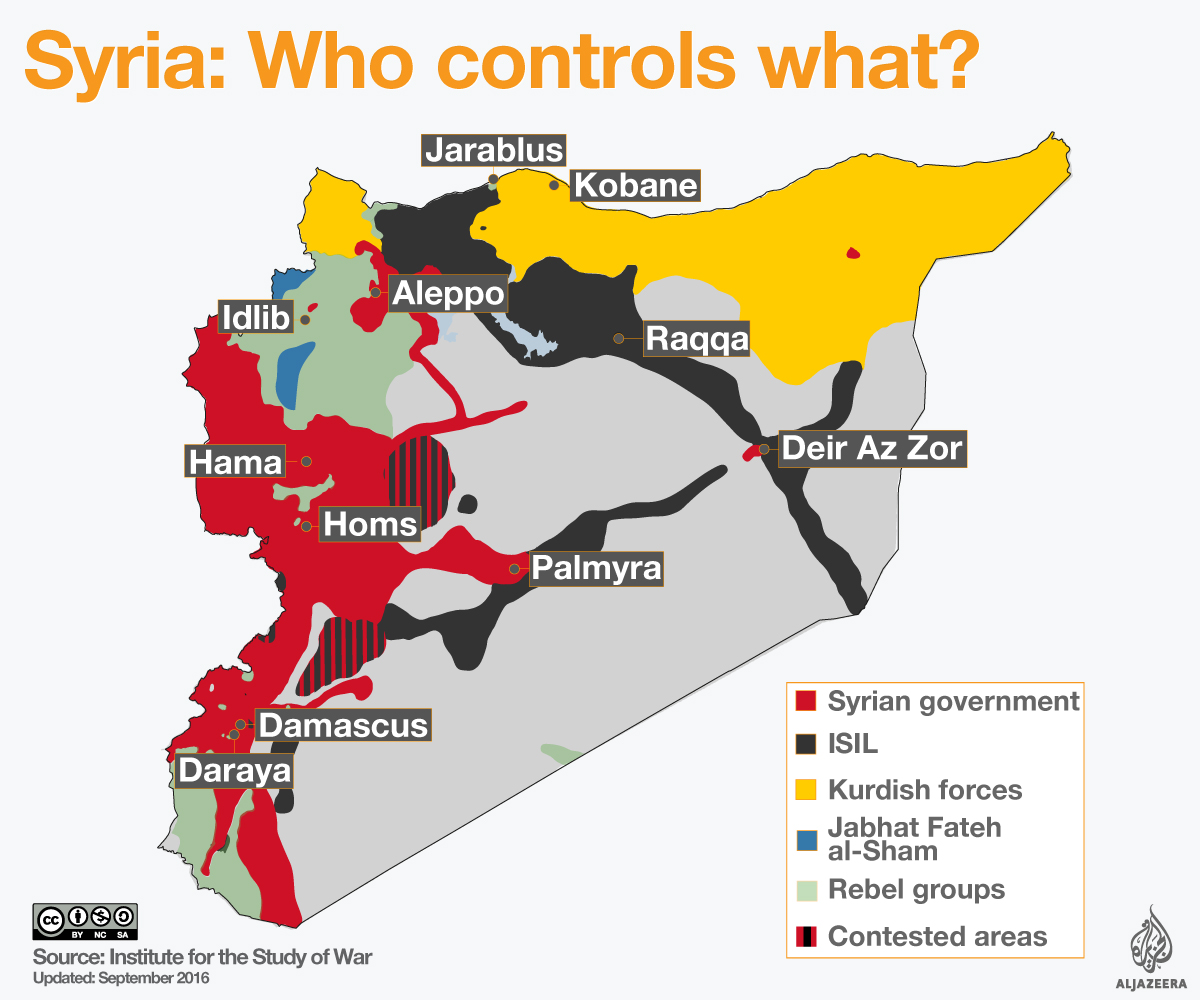Syrian army announces Aleppo push as truce talks fail
Syrian forces tell residents to stay away from rebel positions, as US and Russia fail to agree on how to revive truce.

The Syrian army has announced the start of an offensive to retake rebel-held districts of Aleppo city, just as international powers with a stake in Syria’s civil war failed to revive a collapsed ceasefire during diplomatic talks in New York.
The announcement by the Syrian defence ministry late on Thursday followed several hours of intense air strikes that left parts of Aleppo in flames, according to a monitor and opposition activists.
Keep reading
list of 4 itemsThe Take: Thirteen years later, has the world forgotten Syria?
Jordan army kills drug runners at Syria border amid soaring Captagon trade
Assad arrest warrant: ‘Hope and pain’ for Syrian chemical attack survivors
In a statement on its official website, the ministry “called on residents to stay away from the positions of terrorist groups”.
|
|
It said there would be “no punishment or arrest for any citizen who reaches the checkpoints of the Syrian Arab army”, and that it had “taken all measures to receive civilians and secure their shelter”.
Earlier on Thursday, the Syrian Observatory for Human Rights said “the most intense strikes in months” had triggered “massive fires” in rebel-held Aleppo neighbourhoods, killing at least seven people.
Pro-government forces have surrounded the rebel-held eastern half of the city since July, in an attempt to take full control of the strongest opposition bastion in the country’s north. An estimated 250,000 civilians live in Aleppo’s eastern quarters.
‘Long, painful and disappointing’
Minutes after the announcement of the Syrian army offensive, the US and Russia failed to agree on how to revive a collapsed truce.
The two countries had negotiated the latest ceasefire plan, but Syria ended the week-long truce on Monday following a US-led coalition strike on a Syrian army post.
Shortly after the ceasefire ended, a UN aid convoy was hit in an air strike that US officials have blamed on Russia, the key ally of Syrian President Bashar al-Assad. Moscow has rejected the allegations that Russian or Syrian warplanes carried out the attack, which killed 20 people and triggered the suspension of much-needed relief operations.
Speaking on Thursday after a meeting of the 23-nation International Syria Support Group (ISSG) in New York, US Secretary of State John Kerry said Washington and Moscow “cannot continue on the same path any longer”.
“We can’t go out to the world and say we have an agreement when we don’t. Nor can we tell our partners that there is a cessation when there isn’t,” Kerry told reporters.
“The simple reality is that we can’t resolve a crisis if one side is unwilling to do what is necessary to avoid escalation. And we won’t get anywhere if we begin by ignoring facts and plain common sense, or denying the truth,” he said.
“If the Russians come back to us with constructive proposals, we will listen,” Kerry told reporters.
Staffan de Mistura, the UN special envoy for Syria, described the New York meeting as “long, painful and disappointing”, but added that he wanted to believe that Russia and the US were serious about brokering peace.
“What we got was an intense discussion with no conclusion,” he told reporters. “Time is short and eastern Aleppo is under attack. The next few hours, days maximum, are crucial.”
Humanitarian deliveries
Despite the escalation of violence, the UN said on Thursday that it had resumed aid deliveries in its first operation since the attack on the Aleppo-bound humanitarian convoy.
“Today, we are sending an inter-agency, cross-line convoy with urgently needed aid to people in a besieged area of rural Damascus,” Jens Laerke, the UN humanitarian agency (OCHA) spokesman, said.
Al Jazeera’s Stefanie Dekker, reporting from Gaziantep on the Turkish side of the Syria-Turkey border, said aid had been sent to Moadamiyeh, a besieged suburb of Damascus.
“The UN is hoping to reach four besieged towns, two of those are close to Damascus – Foua and Kefraya – and the other two are close to the border with Lebanon – Madaya and Zabadani,” our correspondent said.
The Syrian civil war started as a largely unarmed uprising against Assad in March 2011, but quickly escalated into a full-blown armed conflict.
Five years on, more than 400,000 Syrians are estimated to have been killed, and almost 11 million Syrians – half the country’s prewar population – have been displaced from their homes.
